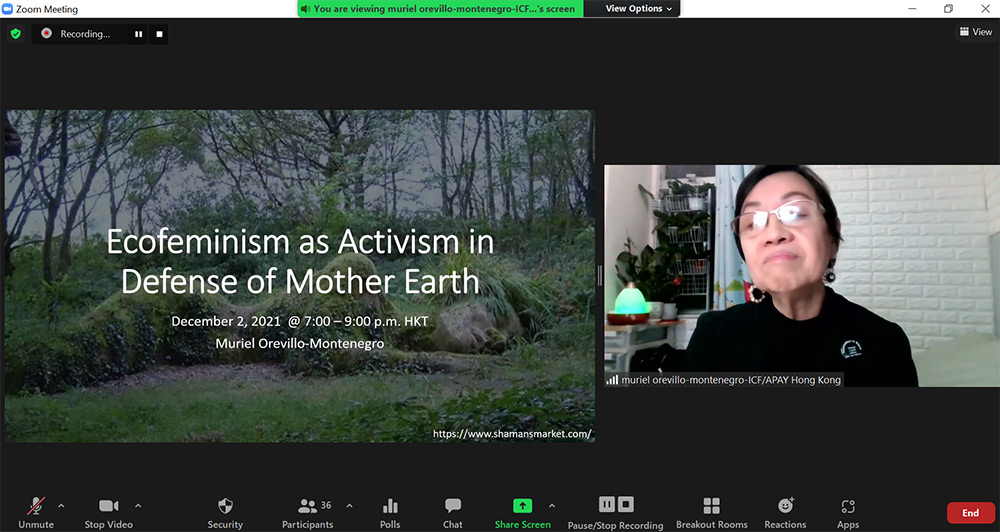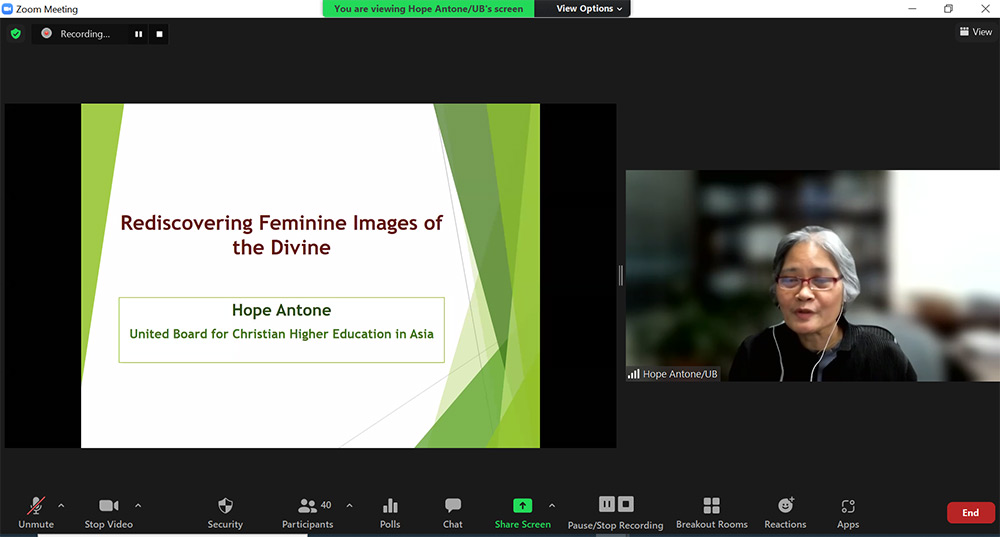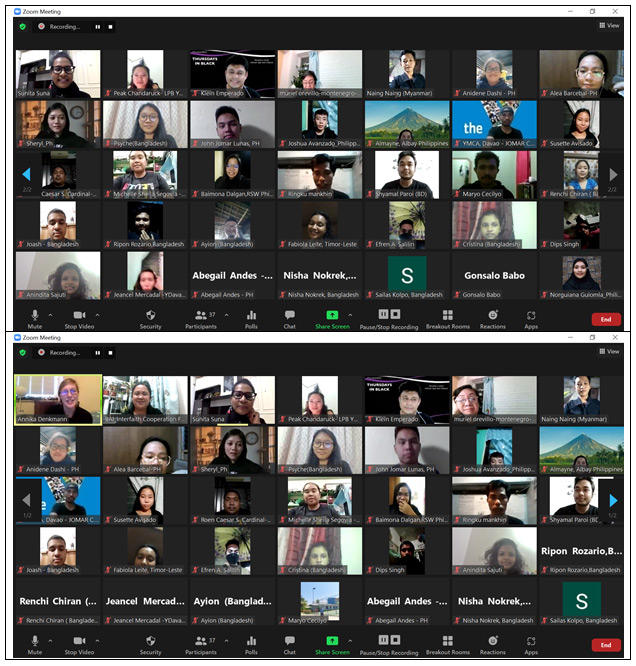ICF conducted Online Workshop on Women’s Rights, the Trailblazers and Ecofeminism
Last Updated (Monday, 24 January 2022 18:13)
ICF joined the global campaign on 16 days of activism against Gender-based Violence by holding a series of online workshops on Women’s Rights, Ecofeminism, and the Trailblazers in the Struggle for Women’s Rights from November 25 and 26 to December 2, 3, and 9, 2021. Forty-one young people from Bangladesh, Cambodia, Laos, Myanmar, Nepal, the Philippines, and Timor Leste participated during the sessions.
 |
 |
During the first session of the workshop, Dr. Hope Antone spoke on “Rediscovering Feminine Images of the Divine.” She organized her presentation into three parts: Universal Declaration of Human Rights, Religion and Women’s Rights, and Feminine Images of the Divine and Women’s Rights. She started each part of her presentation by running a poll that the participants actively answered. On the question of whether the UNDHR document upholds the rights of women, the participants have Yes and No for an answer. She affirmed that yes, it upholds the rights of women. But it is also true to say No because the document is a broad stroke and specific details on how to uphold women’s rights are not in the covenant. UNDHR is not legally binding, more like of road map and a vision statement. The second poll asked whether each religion upholds women's rights. The answers from the participants were Yes, No and Unsure. Dr. Antone noted that the Declaration of Human Rights by the World’s Religions includes women's rights, e.g. full equality with men, to be free from all forms form violence, to marry a person according to their choice, and to marry with free and full consent. The third poll asked if the participants agree that women's rights are grounded or rooted in feminine images of the divine. The participants answered yes, but some answered: "not sure." Dr. Antone proceeded by uncovering the feminine images of the divine from each religion’s sacred text. She pointed out that one must investigate one’s faith resources to rediscover the images of the divine. One also needs to use lenses of gender criticism when reading and analyzing to uncover the feminine images of the divine. She also encourages the participants to recover the qualities of the divine feminine that may be missing today: mothering, abundance, beauty, inspiration, and peace.
Dr. Muriel Orevillo-Montenegro’s topic seemed to be new to the participants: “Ecofeminism as Activism in Defense of Mother Earth.” She started her session by assessing the understanding of the participants on the different words such as feminism, ecofeminism, Anthropocene, religion and nature, and Francis Bacon. A few participants shared their view on feminism briefly, but the rest did not say anything on the remaining keywords. She used a word-study approach and discussed each keyword. She highlighted that feminism is a philosophy grounded on the premise that women’s wisdom on matters that affect them is crucial in patriarchal, sexist, or male-dominated contexts. It is both a critical theory and political movement that seeks justice for women and ends all forms of sexism. She discussed how human beings treat nature from their religious perspectives. Through the concept of Ahimsa, the principle of non-violence, Hindus believe that all living things, including the natural world, are sacred because they are part of God. While the Buddha did not give teachings specifically on this subject, he instructed the monks to never relieve themselves in or near running water and should not disrupt the established habitat of any other creature nor kill other living creatures. Taoism, the indigenous way of life of ancient China, values harmony between people. However, Taoism values, even more, the harmony between nature and humanity. Dr. Orevillo-Montenegro took a critical reading of Genesis 1:28, a favorite text among those coming from the Judeo-Christian tradition, on the role of humans to take care of the earth. She pointed out that the text is problematic because of the Hebrew words kabash and radah, which mean to dominate and subjugate. In Islam, the concept of oneness or Tawhid is reflected in Allah’s creation, and human beings and nature form one whole that humans must preserve. Islam also teaches that individuals should act as a guardian or Khalifah of the earth as a sacred trust. Dr. Orevillo-Montenegro then proceeded to connect the philosophy of Francis Bacon with Genesis 1:28. Bacon took the image of nature as a female to be subjugated as a philosophy to argue for the necessity of extracting nature's secrets. Then, she proceeded to introduce another new word: the Anthropocene as the geologic period that humans heavily influenced. The Anthropocene Epoch is the start of the era of nuclear bomb tests, disposable plastics, and the human population boom that caused earth destruction. The Anthropocene is the beginning of adverse climate change. Ecofeminism is a commitment to defend women’s rights and Mother Earth’s rights. This could be done by taking actual steps to reclaim an earth-based spirituality, with an understanding that spirituality is a day-to-day lifestyle.

In the third session, Ms. Sunita Suna presented her topic on “Remembering the Trailblazers for Women's Rights and Passing on the Torch to the Young Women of Today”. Sunita talked about the four waves of the women’s movement. The first wave of the women’s movement started in the 20th century to advocate for women’s right to vote and political participation. The second wave of the women’s movement was from the 1960s to the late 1980s. It was the reaction to women returning to their roles as housewives and mothers after the end of the Second World War. While the first wave was largely concerned with the struggle for suffrage, the second wave focused more on injustices in both public and private spheres. The movement brought to the forefront the issues of rape, reproductive rights, domestic violence, and workplace safety. This brought about a widespread effort to reform the negative and inferior image of women in popular culture to a more positive and realistic one. The Third Wave of Women’s Movement emerged in the mid-1990s. It was greatly focused on reproductive rights for women. The fourth wave of feminism began in 2012 which focused on sexual harassment, body shaming, and rape culture among other issues. At the end of her presentation, she shared the video of the Sustainable Development Goals that includes gender equality.
The workshop series also included open discussions by the participants to share their reflections on the topics. ICF is grateful to all the resource persons for sharing their expertise and for the participants for their active participation.

Baidido M. Saganding
ICF Program Officer





